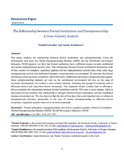Zitierlink:
http://dx.doi.org/10.25819/ubsi/9634Dateien zu dieser Ressource:
| Datei | Beschreibung | Größe | Format | |
|---|---|---|---|---|
| The_relationship_between_formal_institutions_and_entrepreneurship.pdf | 468.11 kB | Adobe PDF |  Öffnen/Anzeigen |
| Dokumentart: | Preprint | Titel: | The relationship between formal institutions and entrepreneurship | Titelzusatz: | a cross-country analysis | AutorInn(en): | Tsatsenko, Natalia Ibrahimova, Ganira |
Institut: | Fakultät III - Wirtschaftswissenschaften, Wirtschaftsinformatik und Wirtschaftsrecht | Schlagwörter: | Formal institutions, Entrepreneurship, Rule of law, Regulatory quality, Control of corruption, Global Entrepreneurship Monitor (GEM), World Governance Indicators (WGI), Formale Institutionen, Unternehmertum, Rechtsstaatlichkeit, Regulatorische Qualität, Korruptionskontrolle, Global Entrepreneurship Monitor (GEM), Welt-Governance-Indikatoren (WGI) | DDC-Sachgruppe: | 330 Wirtschaft | GHBS-Notation: | QAA | Erscheinungsjahr: | 2021 | Publikationsjahr: | 2021 | Zusammenfassung: | This paper explores the relationship between formal institutions and entrepreneurship. Using the international data from the Global Entrepreneurship Monitor (GEM) and the Worldwide Governance Indicators (WGI) projects, we show that formal institutions have a different impact on early-established and mature entrepreneurial activity rates. The relationship between formal institutional dimensions (rule of law, control of corruption, regulatory quality) and two entrepreneurial activity rates (total early-stage entrepreneurial activity and established business ownership rates) are estimated. We theorize that formal institutions create necessary conditions where both early established and mature entrepreneurship operate. Since entrepreneurship depends not only on the institutional environment but also on the stage of economic development, we conduct a cross-country analysis, including two groups of countries such as efficiency-driven and innovation-driven economies. Our empirical results confirm that in efficiency-driven countries the relationship between formal institutions and the TEA rate is more intense, while in innovation-driven countries this relationship is stronger between formal institutions and the established business ownership rate. We also discover that the rule of law plays the most important role in relation to entrepreneurial activities, meanwhile in the case of mature entrepreneurship in efficiency-driven economies; regulatory quality turns out to be more important. |
DOI: | http://dx.doi.org/10.25819/ubsi/9634 | URN: | urn:nbn:de:hbz:467-18643 | URI: | https://dspace.ub.uni-siegen.de/handle/ubsi/1864 | Lizenz: | http://creativecommons.org/publicdomain/zero/1.0/ |
| Enthalten in den Sammlungen: | Publikationen aus der Universität Siegen |
Diese Ressource ist urheberrechtlich geschützt. |
Seitenansichten
644
checked on 25.12.2024
Download(s)
372
checked on 25.12.2024
Google ScholarTM
Prüfe
Prüfe
Diese Ressource wurde unter folgender Copyright-Bestimmung veröffentlicht: Lizenz von Creative Commons


